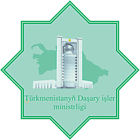Magtymguly Fragi»




Over the past nearly twelve years, RECCA with its Ministerial, Academic, Business and Youth Forums has gradually developed to serve as a leading regional economic cooperation platform in promoting cross- border economic cooperation through policy dialogue, trust building and activities in areas such as trade and connectivity, energy, natural resources and business to business cooperation in Central, South and Southwest Asia.
Building on the momentum and concurrence reached out at the past RECCAs held since 2005 in Kabul, New Delhi, Islamabad, Istanbul, Dushanbe and again in Kabul in September 2015, we need to continue to strengthen the synergies and partnerships that exist under RECCA with a view to better craft new opportunities and further unleash the huge potential of our region in cross border economic cooperation and integration.
In the case of Afghanistan as a land-locked country, trade integration and alternative transit destinations are currently at the cornerstone of our engagement with regional countries. We are committed to avail the unique geographical position of Afghanistan to serve as a hub for trade and transit connecting Central Asia to South Asia and the Middle East to Far East including in the area of energy cooperation to the benefit of development and prosperity in the wider region and beyond.
As the RECCA VI Strategy titled “Towards Regional Economic Growth and Stability: the Silk Road through Afghanistan” defines: “A viable export led growth and revenue option for Afghanistan is the extractive industry. At the same time, with little to trade except some agricultural products and with extractives not set for a quick lift off, Afghanistan needs to focus principally in the near term on transit and attracting private capital to the economy-both of which are a chief focus of the twenty Regional Cooperation and Investment Projects presented in the RECCA Annual Review 2016.”
RECCA’s new approach towards project implementation has started yielding positive outcomes including though further engaging the private sector as well as limiting RECCA projects to bankable ones which are viable for feasibility studies and financing and which can be implemented within a specific timeframe (one to three years).
Since RECCA VI, as we acknowledge, the progress made with respect to some regional and sub-regional projects is promising which can be exemplified by the inauguration of the Turkmenistan-Afghanistan-Pakistan and India (TAPI) gas pipeline project; the commencement of the implementation phase of Central Asia-South Asia (CASA 1000) electricity transmission line from Kyrgyzstan and Tajikistan to Afghanistan and Pakistan; Signing of the Chabahar trilateral international transport and transit agreement between Afghanistan, Iran and India as well as the inauguration of the construction activities of the trilateral railway project between Turkmenistan, Afghanistan and Tajikistan also called the Asian International Railways Corridor.
Furthermore, the signing ceremony of the Lapis Lazuli Trade, Transit and Transport Agreement between Afghanistan, Turkmenistan, Azerbaijan, Georgia and Turkey will take place in Kabul soon.
The RECCA Annual Review 2016 provides a list of 20 projects in key areas of energy; transport networks; trade and transit facilitation; communications; and B2B and labor support which constitute our agenda of work in short to med-term.
The RECCA team will soon start consultations with our partners both in Kabul and Ashgabat as well as in various regional capitals to discuss the progress and implementation bottlenecks as well as the steps that need to be taken in run-up to Seventh RECCA Meeting to be held from 14-15 November in Ashgabat.
In this context, I wish to highlight the following key point:
Sinking regional efforts under RECCA and the Heart of Asia-Istanbul process to our contributions to other regional frameworks such as ECO, SAARC, CAREC, SCO, and SPECA etc. is the other major policy priority for us.

